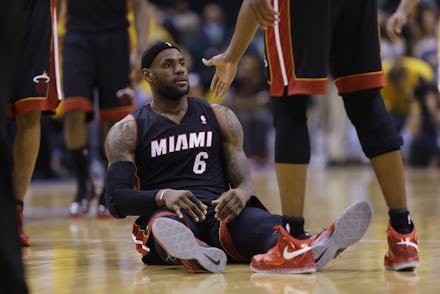Are Referees to Blame for the Worst Playoff Game of LeBron James' Career?

The Miami Heat entered last night's Game 5 of the Eastern Conference Finals with a three-games-to-one lead over the Indiana Pacers in the best-of-seven series. A win would have vaulted the defending champions into the NBA finals for a fourth straight year, putting them in rare company; only the Boston Celtics (1957–66; '84–87) and the Los Angeles Lakers ('82–85) have made as many consecutive appearances in the league's championship series.
But LeBron James was dogged by foul trouble all night, playing just 24 minutes and finishing with seven points, his lowest output in 152 career playoff games. With the four-time Most Valuable Player mostly reduced to cheerleader duties, the Heat suffered a 93–90 loss to prolong the series at least one more game.
For a superior defender like James, the circumstances were strange. He fouled out just once during the regular season and reached five fouls only twice. A closer look at the fouls that limited LeBron's involvement raises further questions.
It's one of the oldest chestnuts in the conspiracy theorist's handbook: The NBA, looking to maximize TV ratings, ticket sales and ad revenue, has a vested interest in extending these playoff series as long as possible. The stakes are theoretically redoubled when a top box-office draw like Miami is involved. It can't be overstated how little the task would require. The ripple effect of even one or two bad calls on the outcome of a game has been exhaustively documented, most notably by statistical pioneer Dean Oliver in his essential Basketball on Paper.
The premise has been punctured time and again by some of the brightest observers around the league: Why would the NBA risk its entire credibility over the short money? And it warrants mention that clamor over Wednesday's officiating isn't unanimous. CBSSports.com writer Matt Moore's Zapruder-like breakdown of the GIFs offers a more charitable viewpoint, if not outright dissent.
The outcry could otherwise be dismissed as the product of overactive imagination if these theories hadn't crossed over from the realm of fantasy in 2007, when the NBA was rocked by the scandal surrounding Tim Donaghy, the former referee who pleaded guilty to federal charges of conspiracy after confessing to influencing the outcomes of games he officiated. Donaghy said in a court filing that "top executives of the NBA sought to manipulate games using referees" and gave preference to officials who were "'company men,' always acting ... in the NBA's interest to add another game to the series."
Then-commissioner David Stern dismissed Donaghy's allegations as the fabrications of a "singing, cooperating witness" and a "rogue referee," a lone gunman theory that stuck. The master class in damage control would have made Olivia Pope beam.
When presented with a choice between human error/incompetence and corruption, the fans who invest their time and emotion in these games are prone to believe in the former, even when evidence of the latter is public record. They returned to the NBA after the Donaghy fallout just as the ultras came back to Serie A after the match-fixing scandal that rocked Italian soccer in 2006. We love our sports.
But the psychological aftereffects of these episodes run deep. Attributing the fouls that benched LeBron to a conspiracy theory might be not an appropriate or logical answer, but prior experience certainly makes the question valid — necessary, even.
Despite all this, the Heat had possession on Wednesday with a chance to tie or win in the final seconds. James drove past Indiana's Paul George, took off from the foul line but kicked it out to a wide-open Chris Bosh, whose missed three-pointer sealed Miami's fate. LeBron's decision to pass up the final shot (a callback to the big-moment deference that informed his early-career rep) will no doubt be argued breathlessly and command ESPN's screen-filling chyrons until Friday night's Game 6. Which is just how the NBA likes it.